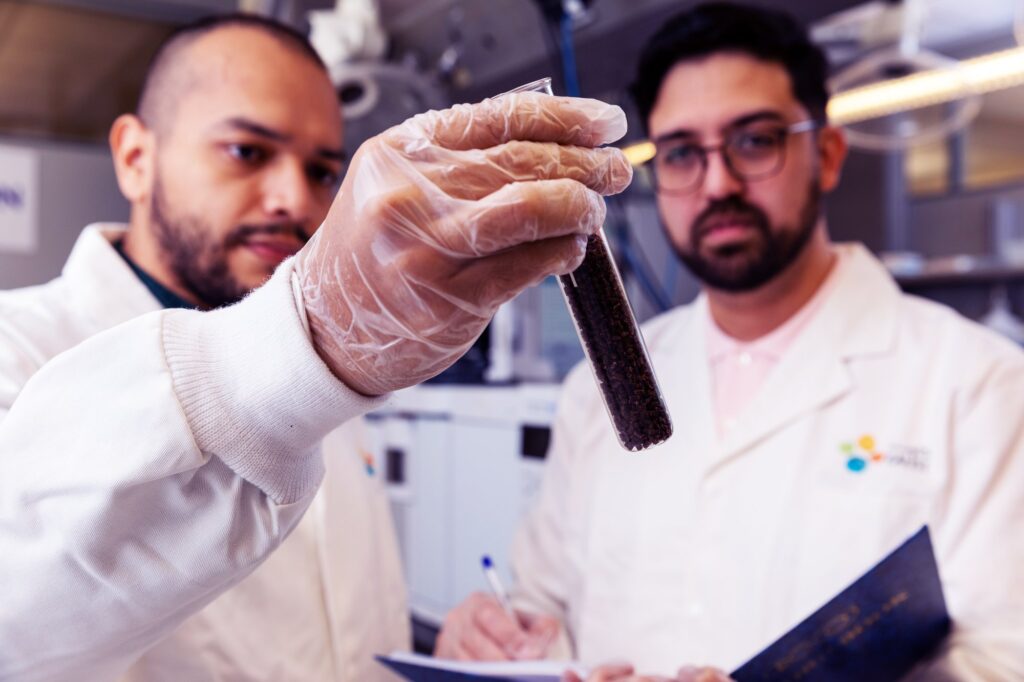Vision 2030 aims to grow the Kingdom's industrial sector by investing in more Saudi Arabian-based businesses—our driving force at KAUST Innovation. We develop diversified technology startups through our state-of-the-art labs, testing stations, and innovation hubs, providing support through all the stages of startup growth, from training to investment and commercialization.
Vision 2030 highlights the importance of startup development to Saudi Arabia's long-term prosperity and economic diversity. To encourage growth in this key area, KAUST Innovation invests in Saudi-made commercially-ready products and technologies that match our five research pillars: food, water, energy, environment, and the digital domain.
Here are some of the most ground-breaking Saudi technologies to come from KAUST Innovation's ecosystem:
- Single-use bioplastics
- Salt-tolerant plants
- Accessible indoor gardening
- Collapsible solar shading
Single-use bioplastics
Traditional single-use plastic—like plastic bags or bottles—requires oil or natural gas. KAUST startup Polymeron develops single-use bioplastics from the date waste generated at Saudi farms. Their bioplastic decomposes in the ocean in just four months, so less plastic ends up in the environment or on the Saudi coastline.

Typically, bioplastic requires large amounts of plant material. But growing crops is already a challenge in Saudi—so growing them just for use in plastic isn't an option. Rather, Polymeron uses the one million tons of date farm waste produced across Saudi to reduce waste entering landfills and eliminate single-use plastics.
Polymeron joined the 2020 TAQADAM Accelerator as the first producer of bioplastics in the MENA region. They were given funding and facilities to produce their plastics and continue their research. A Saudi product like this helps people across the MENA region reduce their dependency on oil exports and carbon footprint. In addition, less plastic will wash up on Saudi coastlines.
Learn more about Polymeron on their website.
Salt-tolerant plants
If you were to water your plants with salt water, you would likely kill them. That's why, in the past, all water had to be desalinated for traditional farming. But KAUST startup spin-out Red Sea Farms developed ground-breaking technology to grow salt-tolerant plants in advanced, solar-powered greenhouses. They are breaking the food-water-energy nexus by reducing agriculture's dependency on both energy and freshwater.

Agriculture in the MENA region requires food to be grown in large greenhouses with desalinated water. Both technologies require lots of energy, which means a high carbon footprint. The only previous alternative was importing food, which has an equally high-energy requirement and reduces Saudi's food independence.
Red Sea Farms worked with KAUST Innovation through the Research Translation Grant, TAQADAM Accelerator, and KAUST Innovation Venture fund to develop technology that would cut the energy needed to grow crops by up to 95%. Their mix of salt-tolerant plants, smart water systems, and solar power means that Saudi farms can get more food from less freshwater and energy. Red Sea Farms continues to attract investors and expand its technology development and currently uses a large greenhouse in KAUST Innovation's research park.
Learn more about Red Sea Farms by visiting their website.
Accessible indoor gardening
On average, the KSA and the MENA region are hot and dry. This environment makes growing food outside in backyard gardens difficult and can lead to challenges with food security. Natufia developed an indoor, automated greenhouse for growing herbs and small produce regardless of the weather or season.

Their "Smart Garden" maintains the ideal temperature, humidity level, and water requirements for many plants during germination and growth. Natufia's systems allow food to be grown in the kitchen, reducing the carbon requirements needed for transportation from the farm to the store, then to home.
Natufia was founded in Estonia and "spun in" to KAUST and Saudi Arabia in 2021. Natufia received $2 million in funding and a home in the KAUST Research and Technology Park. In the months since, they've developed more compact smart systems that allow more people to grow herbs and plants in their homes. Learn more about Natufia by visiting their website.
Collapsible solar shading
In Saudi greenhouses, shades regularly need to be deployed to maintain the ideal temperature and ensure that plants get the right amount of sun each day. Generally, these shades do one thing—block sunlight. Mirai Solar makes solar panel shades that create energy while also allowing light to pass through to what's below.

These shades capitalize on the wasted sun in greenhouses, where some light needs to be blocked from the growing plants throughout the day. The power collected provides energy to the desalination and temperature control systems. Now, farmers can use less oil and natural gas to grow their crops.
After graduating from TAQADAM, KAUST supported Mirai's research and development with funding through the Research Translation Fund. The team at Mirai then used those funds to scale up, incorporate, and obtain seed funding. Now, they're looking at other applications for their retractable solar shades—for example, to be used as building facades or over playgrounds or parking lots. There's also a brewing partnership project between Mirai Solar and Red Sea Farms to see how replacing greenhouse shades with solar shades could further eliminate carbon emissions from crop growth.
Learn more about Mirai Solar by visiting their website.
Grow your Saudi-made deep tech startup with KAUST Innovation
KAUST's startup and spin-in growth demonstrate the University's ongoing commitment to building, supporting, and nurturing early-stage startups and SMEs in Saudi Arabia. Saudi products like the ones above help grow the private sector—taking us further away from dependency on oil exports and closer to the goals of Vision 2030.
Join KAUST Innovation and grow your technology by applying to the TAQADAM Accelerator. If accepted, you'll work and form connections with the latest startups and experts in deep tech fields. Then your research can impact Saudi and the MENA region as a whole.

